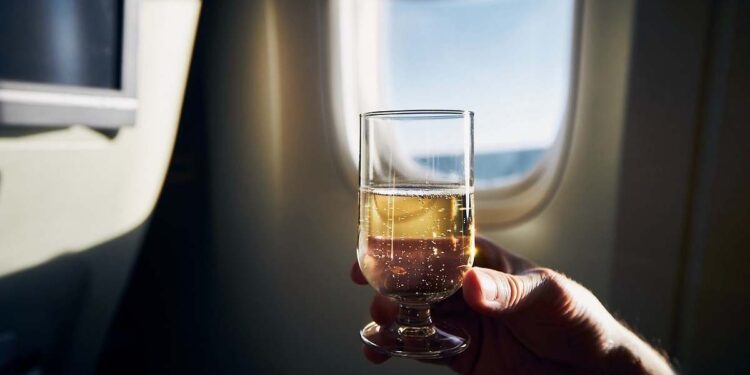At the end of takeoff, many onboard sales services of many airlines offer passengers various products, such as coffees and soft drinks, sandwiches and snacks, and even complete menus. And although it is not common, it is also possible to purchase different types of alcohol, such as beer, wine, or mixed drinks. Liquors whose sale, according to a group of researchers from two universities in Germany, should be prohibited, especially on long-haul flights.
The claim of these researchers, from the Institute of Aerospace Medicine (Cologne) and the Technical University of Aachen, is based on the results of a trial that they themselves have conducted and that has just been published in the respiratory journal Thorax.
“Professionals, passengers, and crew should be informed about the potential risks, and it may be beneficial to consider modifying regulations to restrict access to alcoholic beverages on planes,” note the authors. But what have they discovered?
The main conclusion is that alcohol consumption, combined with cabin pressure at high altitude, can endanger the heart health of passengers who are used to sleeping on the plane. In particular, they have found that this duo reduces the amount of oxygen in the blood and increases heart rate for a prolonged period.
According to this study, this circumstance can occur in all types of passengers, including young and healthy individuals. However, risks increase among older passengers and those with pre-existing medical conditions. Also, the higher the level of alcohol consumed.
Sleeping at 2.5 km altitude
To discover this phenomenon, the researchers recruited 48 people between 18 and 40 years old and divided them into two groups (24 people each): one was sent to an altitude chamber that imitated cabin pressure at cruising altitude (2438 meters above sea level), while the second group was sent to a sleep laboratory with normal pressure conditions.
Each of these two groups was then divided into two more groups. Twelve people from each group slept for 4 hours without consuming alcohol, while the other twelve slept for 4 hours after consuming alcohol. Specifically, participants drank pure vodka in an amount equivalent to two cans of beer or two glasses of wine.
Oxygen and heartbeats per minute
Among those who slept in normal pressure conditions, there were hardly any differences in blood oxygen levels (those who consumed alcohol had 95% blood oxygen compared to 96% for those who did not). However, the difference was more substantial in heartbeats per minute (73 for the former compared to 64 for the latter).
However, the differences were much more noticeable in the air. At over two kilometers altitude, the oxygen level of those who consumed alcohol dropped to 85% (compared to 88% for the abstainers). As for heart rate, those who consumed alcohol rose to 88 beats per minute, far from the 73 beats per minute of those who did not consume alcohol.
Oxygen levels below a healthy level (less than 90%) lasted 201 minutes with the combination of alcohol and simulated cruising altitude pressure. This compares to a period of 173 minutes without alcohol and 0 minutes with and without alcohol in sleep laboratory conditions.
Therefore, the researchers claim that “the combination of alcohol intake with sleep in hypobaric conditions places considerable strain on the cardiac system and could lead to worsening symptoms in patients with heart or lung diseases.”
As limitations, the authors identify that the sample size (48 people) was too small and that their demographics (up to 40 years old) do not allow for conclusions to be drawn for the general population. On the other hand, they also point out that the data of the participants were collected while sleeping in a supine position (a luxury normally only allowed to those flying first class), so the findings may not apply to most economy class passengers on airplanes.


